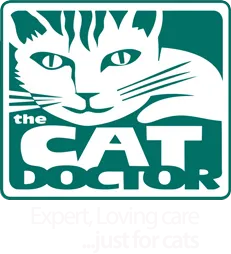Dentistry
 According to the American Veterinary Dental Society, 70% of cats have oral disease by the age of 3, and it is the most frequently diagnosed health problem in cats. Common signs of oral disease can include bad breath, tartar buildup, red and swollen gums, changes in eating or chewing habits, pawing at the face and generalized depression. Many cats can have significant oral disease (abscessed or fractured teeth) without showing ANY outward signs of discomfort, even though oral disease is very painful for your cat.
According to the American Veterinary Dental Society, 70% of cats have oral disease by the age of 3, and it is the most frequently diagnosed health problem in cats. Common signs of oral disease can include bad breath, tartar buildup, red and swollen gums, changes in eating or chewing habits, pawing at the face and generalized depression. Many cats can have significant oral disease (abscessed or fractured teeth) without showing ANY outward signs of discomfort, even though oral disease is very painful for your cat.
A veterinarian should evaluate your cat’s dental health at least once a year. We recommend this because bacteria and food debris accumulates around cat’s teeth and, if left unchecked, will lead to deterioration of the soft tissue and bone surrounding the teeth. This decay results in irreversible periodontal disease, resorptive lesions and even tooth loss, which can be excruciatingly painful, especially when disease is advanced.
There are other reasons why you should pay close attention to your cat’s dental health. Dental disease can affect other organs in the body: bacteria in the mouth can get into the blood stream and may cause serious kidney infections, liver disease, lung disease, and heart valve disease. Oral disease can also indicate that another disease process is occurring elsewhere in a cat’s body. A thorough physical exam combined with appropriate laboratory work can determine if this is the case.
Just as our own teeth require periodic dental cleaning and assessment, even more so do our cats. The procedure for cleaning your cat’s teeth is no different from that which we experience at our own dentist. The only complication is that our cats won’t just sit still and say “Ahh”! A general anesthetic is required in order to safely scale, probe, assess and polish all surfaces of all of the teeth. We also can take oral radiographs (X-rays) to ensure your cat’s teeth are healthy above and below the gum line.
Providing a variety of dental treats, if and when possible, practicing a routine of regular brushing can help decrease the number of dental procedures your cat requires in a lifetime.
Beware of "Anesthesia Free" Dental procedures
They are of poor value and can be very dangerous to your cat. Problems with these may include :
 Risk of tooth surface fracture as tartar is scraped off.
Risk of tooth surface fracture as tartar is scraped off.
 Inability to polish teeth which leaves a rough tooth surface that is easy for plaque to stick to.
Inability to polish teeth which leaves a rough tooth surface that is easy for plaque to stick to.
 Inability to clean every tooth surface or to clean below the gum line where dental disease affects tooth root and overall health.
Inability to clean every tooth surface or to clean below the gum line where dental disease affects tooth root and overall health.
 Risk of aspiration or ingestion of pieces of tartar as they are removed.
Risk of aspiration or ingestion of pieces of tartar as they are removed.
 Risk of uncooperative cat hurting themselves or others due to fear or stress.
Risk of uncooperative cat hurting themselves or others due to fear or stress.
January and February are Dental Months.*


*The Cat Doctor offers discounts during these 60 days.

